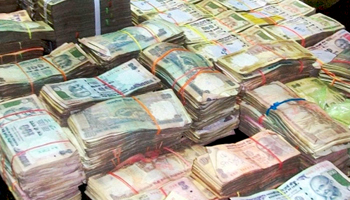New Delhi, Sep 4: After a lull, the Supreme Court on Thursday put the spotlight back on black money by asking the Centre to give details of action taken on the special investigation team's (SIT) recommendations advocating stringent measures against irregularities in capitation fees, cricket, stock markets and trade-based money laundering.

A bench of Chief Justice H L Dattu and Justices Madan B Lokur and A K Sikri asked attorney general Mukul Rohatgi, "What is the fate of these recommendations by the Supreme Court-appointed SIT? The Centre will tell us about it in the next hearing on October 28."
The bench also told senior advocate Dushyant Dave, who appeared for the SIT headed by former Supreme Court judges M B Shah and Arijit Pasayat, to ask the SIT to submit its fresh report by October 7 on ways and means to tackle the menace of black money.
Advocate Prashant Bhushan requested the court to make public the SIT reports but Dave objected, saying it would be unwise to make the reports public, except the recommendations. "The reports include analysis of intricate economic issues and policies. Till the government initiates action on these recommendations, it will not be proper to discuss the reports in public," he said. The bench agreed with Dave.
The SIT had given a string of recommendations in its third report submitted to the SC in May. The Centre will now be required to inform the SC on October 28 of the action it has taken on the following recommendations:
* To control generation of black money through huge capitation fees, mostly paid in cash, to technical and medical colleges for admissions. A specific provision should be inserted in Prevention of Corruption Act to make acceptance of cash by educational institutions a punishable offence.
* Large donations, including gift of ornaments, to religious and charitable institutions should be accompanied by PAN number of the donor.
* Illegal activity of cricket betting requires to be controlled by some provisions which are deterrent to all concerned. Considering the fact that large amount of black money is generated and used in this sector, it is suggested that some appropriate legislative directions or rules or regulations are required to be put in place to curb the menace of such betting.
* Ban on bulk transactions through cash. A number of European countries bar any cash transaction above a particular limit. This can be done in India.
* For holding cash/currency notes, there should be a limit by prescribing a reasonable threshold, may be Rs 10 lakh or Rs 15 lakh. This will control holding of unaccounted money to a large extent.
* SEBI needs to have an effective monitoring mechanism to study unusual rise of stock prices of companies while such a rise is taking place. In case it is established that stock platforms have been misused for taking long-term capital gains tax benefits, prosecution should be invariably launched.
* Obtaining information on 'beneficial ownership' of participatory notes is of crucial importance to prevent their misuse. SEBI needs to examine the issue and come up with regulations where the 'final beneficial owner' of participatory notes/offshore derivative instruments are known.
* Proactive detection of creation of shell companies, which are used to provide accommodation entries to launder black money. Deterrent penal action against persons involved in creation of shell companies and providing accommodation entries needed.





Comments
Add new comment